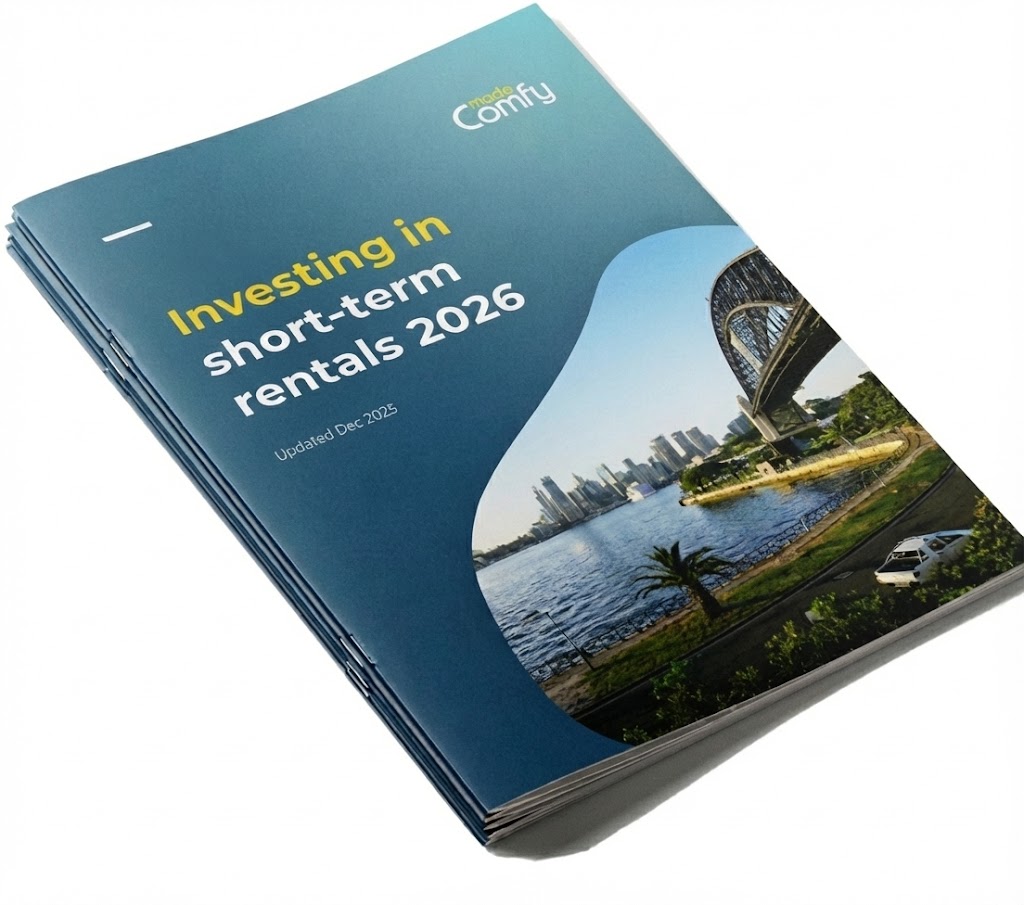What the new NSW rental reforms mean for short-term rental hosts

The 2024–25 changes to NSW rental laws are reshaping how property investors lease out homes. While most rules target long-term rentals, there are major flow-on effects for Airbnb and short-term rental (STR) owners—especially those juggling both markets. Here's what you need to know.
Key reforms at a glance
These new laws came into effect between October 2024 and May 2025, under the Residential Tenancies Amendment Act 2024. While they mainly apply to standard residential tenancies (90+ days), landlords moving between STR and long-term leasing need to be especially cautious.
Notable changes
- No-grounds eviction ban (from 19 May 2025): You need an approved reason to end a lease—no more ending “just because.”
- Rent increase cap (from 31 Oct 2024): Rent can only go up once every 12 months per tenancy.
- Pet-friendly defaults (from 19 May 2025): Tenants can request to keep pets. Landlords can’t say no without clear legal grounds.
- Ban on application fees: You can’t charge tenants fees for applying, screening, or signing leases.
- Fee-free payment options: You must offer tenants a free method to pay rent, such as bank transfers
Do these reforms affect short-term rentals?
Generally, no—if your property is rented for less than90 days (e.g., Airbnb stays), standard tenancy laws don’t apply. However:
- Hybrid landlords (switching between long-term and short-term rentals) must follow the new rules for any lease over 90 days.
- Mid-term rentals (3–6 months) may unintentionally trigger tenancy laws if the stay exceeds 90 days as a residence.
- STRs still have separate rules, like NSW’s Short-Term Rental Accommodation Code of Conduct and local council day limits (e.g., 180-day cap in Greater Sydney).
How the new laws affect property strategy
Here’s a breakdown of the three biggest changes and what they mean for your bottomline.
1. You can’t end a lease without grounds
Do you want to reclaim your apartment for Airbnb during summer? Now you can’t just wait for the lease to end and say “time’s up.” You need a valid legal reason, such as moving in yourself, selling the property, or substantial renovations. And you’ll need to prove it.
- Before: Landlords could end a lease without reason.
- Now: Need a valid ground (e.g., selling, moving in).
- Impact: Harder to reclaim a property for STR use. If you want flexibility, avoid long-term leases or plan lease terms carefully.
- Tip: If you plan to switch to STR seasonally, use fixed-term leases that naturally expire before your preferred Airbnb period.
2. Rent can only be raised once per year
There’s no cap on how much you can raise rent—but you can only do it once every 12 months. Even if the tenant signs a new lease, the 12-month limit carries over.
- Before: Rent could be raised more frequently (e.g., every 6 months).
- Now: Only once per 12 months.
- Impact: Long-term rental income grows slower, making STRs (with dynamic pricing) more attractive for yield-focused investors.
- STR Advantage: Airbnb and similar platforms allow nightly price changes, making them more flexible and inflation-proof. Many landlords may see STR as a better option for tracking fast-moving markets.
3. Pets are now the norm
Landlords can no longer ban pets outright. If a tenant requests approval via the standard form, you have 21 days to respond—or it’s auto-approved. Refusals are only allowed on strict legal grounds (e.g., pet would damage property or breach strata rules).
- Before: Landlords could ban pets outright.
- Now: Must consider pet requests and can only refuse on approved grounds.
- Impact: Long-term landlords must adapt (e.g., pet-proof properties). STR owners can still set their own pet policies (and charge cleaning fees).
Compliance tips for hybrid hosts
If you lease long-term part of the year and do STR in peak seasons, be sure you:
- Use fixed-term leases ending before STR season.
- Have clear evidence for lease termination if using approved grounds (e.g. renovation plans).
- Process pet requests within 21 days using the official form.
- Offer fee-free payment options (e.g. bank transfer).
- Avoid illegal fees in your advertising or lease packs.
- Track your rent increase timing—only once per year.
- Register your STR with the NSW STRA portal if required.
Penalties
Non-compliance with the newly implemented regulations will incur the following penalties:
- $5,500+ for illegal fees or pet refusals
- $11,000+ for wrongful evictions
- Up to $71,500 if you operate under a company name
FairTrading is actively enforcing these rules, with spot audits and tenant complaints leading to Tribunal hearings.
Future changes to watch
- Late 2025: Portable bond scheme (transfer bonds between rentals).
- Possible future reforms: Rent increase justifications, energy efficiency standards.
Switching to STR made easy with MadeComfy
Many landlords are turning to short-term letting to sidestep rent caps and reclaim income flexibility. But managing anSTR takes time, skill, and compliance.
If you’re considering short-term rentals for higher returns and flexibility, MadeComfy can help with:
- Free STR income estimate: See how much your home could earn vs long-term rent.
- Dynamic pricing: Get the best nightly rates using hotel-style pricing tools.
- Full-service management: We handle bookings, cleaning, guest support, and compliance.
- Regulation guidance: We help you navigate council caps, registration, and strata laws.
- Owner flexibility: Block out dates for your own use with no hassle.
Switching to short-term rentals under the new rules makes sense—but doing it right matters even more. MadeComfy helps you earn more and stress less.
Get a free rental appraisal to see how your property could perform as an STR under the new laws. CONTACT US today.


























